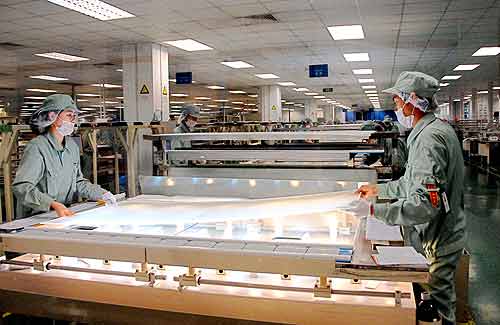|
 |
|
SOLAR GIANT: A solar panel production line in Wuxi-based Suntech Power Holdings Co. Ltd. in Jiangsu Province. Suntech Power in control of 14 patents became one the world's top 10 solar panel producers in 2004 (SUN LIN) |
China will soon announce a decision to rev up seven strategically important emerging industries, said the National Development and Reform Commission (NDRC). The NDRC, the Ministry of Science and Technology, the Ministry of Finance, and the Ministry of Industry and Information Technology jointly drafted the decision, which has been submitted to the State Council for approval after public opinion was canvassed.
The four ministries have been conducting research on the development of strategically important emerging industries since the beginning of this year. The seven industries include information industry, bio-industry, energy conservation and environment protection, new energy, new material, new-energy vehicles and high-end equipment manufacturing.
Specific plans and supporting policies at all levels will be introduced consecutively to facilitate the implementation of the decision in each industry.
Such an enormous plan, second in size only to the $586-billion stimulus package, aims to create fundamental changes in China's economic growth and industrial development structure, said Li Shuchong, Senior Consultant with CCID Consulting, China's Hong Kong-listed consulting company.
Profound influence
The decision has several highlights, said Li, while analyzing its content.
First, the seven emerging industries are labeled "strategically important," indicating they are crucial to steering China's industrial sector down a technology-intensive, high value-added development path, instead of a labor-intensive, resource-reliant one.
Second, the seven industries involve many sub-industries and different market segments. These will serve as a trailblazer for the next round of industrial upgrading, he said.
They will also allow local governments the ability to choose the right industries for their particular situations. This will, to some extent, help avoid overcapacity in one particular industry, he added.
Third, some of the industries, such as bio-industry, information industry, new energy, equipment manufacturing and new material industries, are labeled as fundamental core industries. They encompass sectors featuring weak innovation capacities, such as software and integrated circuit in the information industry, he said.
The plan for emerging industry development will have a profound influence on the country's industrial development in the coming decade, he said.
The Chinese economy and industrial sector have enjoyed enormous achievements in the past three decades of reform and opening up. While expanding in scale, the industrial sector is moving into a new development period of structural upgrading.
"The first question to be answered during the process is how to upgrade the industries and which industries will help promote the upgrading. A simple answer could be the high-end emerging industries which, with high value-added, are usually technology-intensive and will help boost the development of supporting peripheral industries," Li said.
Actually, many local governments have beefed up support to emerging industries in recent years. Jiangxi Province, for example, introduced China's first provincial-level incentives to develop emerging industries in December 2009. The province selected 10 industries, including the photovoltaic industry, wind power and nuclear power generation, new-energy vehicle and power battery manufacturing industries. Liaoning and Hubei provinces also promoted similar incentives this spring. Liaoning, an old heavy manufacturing base in northeast China, selected nine industries, including those involved in equipment manufacturing and new energy. Hubei, in central China, also picked nine industries, including energy conservation and environment protection, biochemical and the information industry.
|
